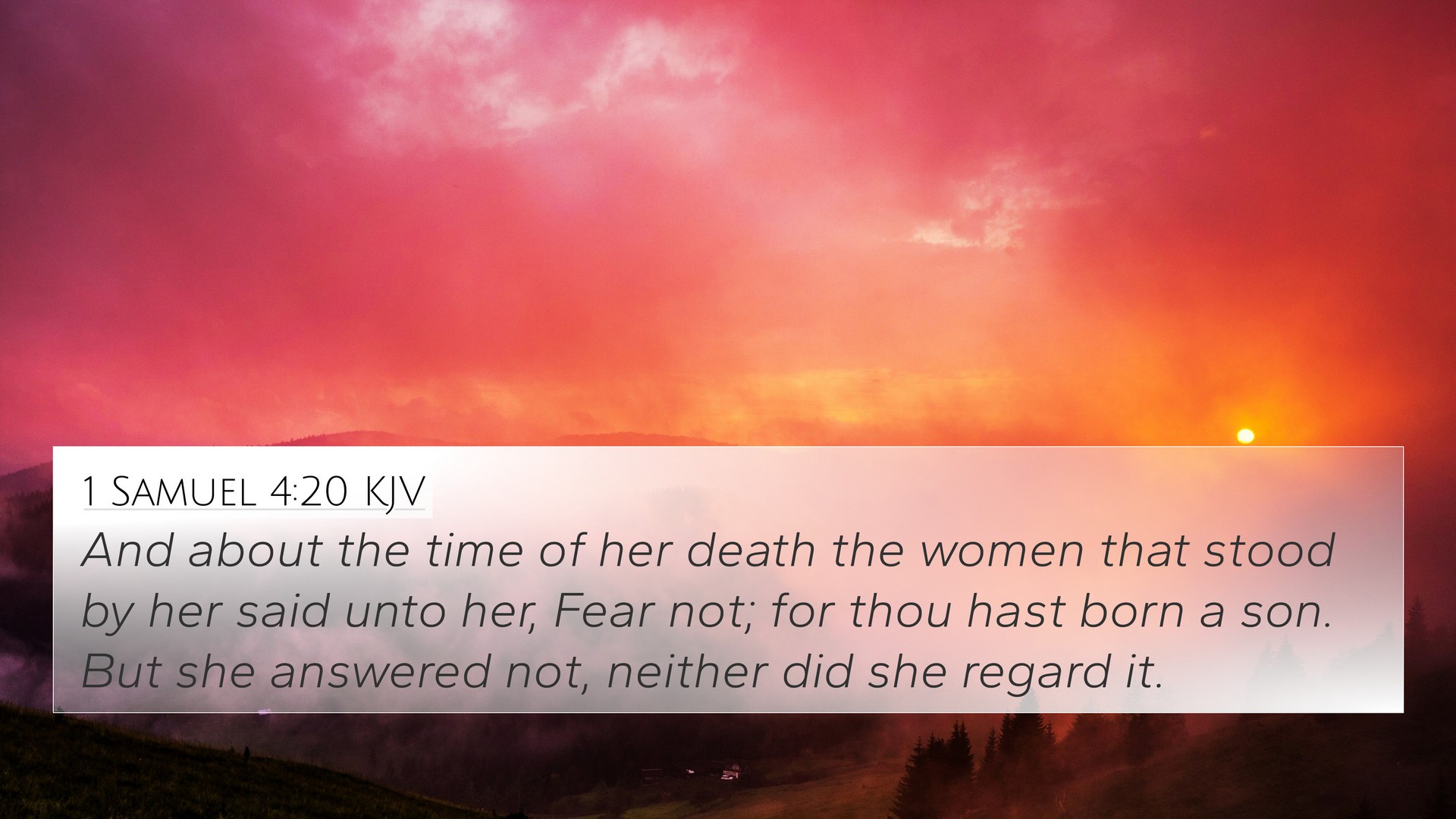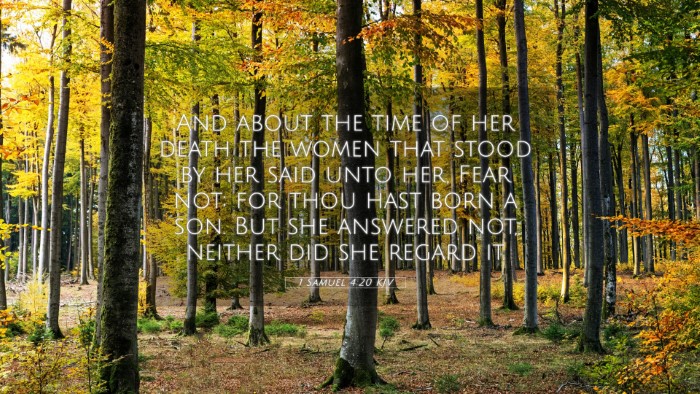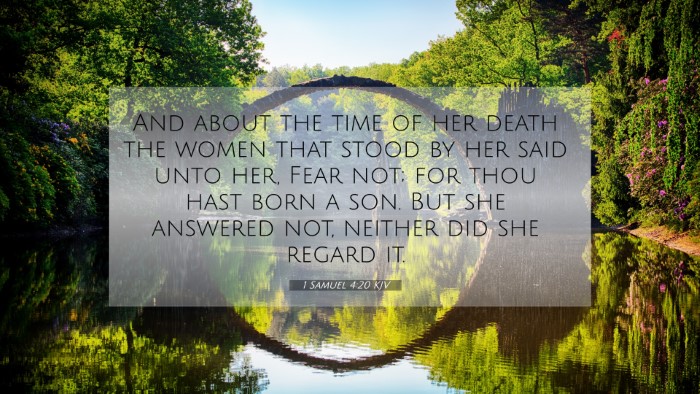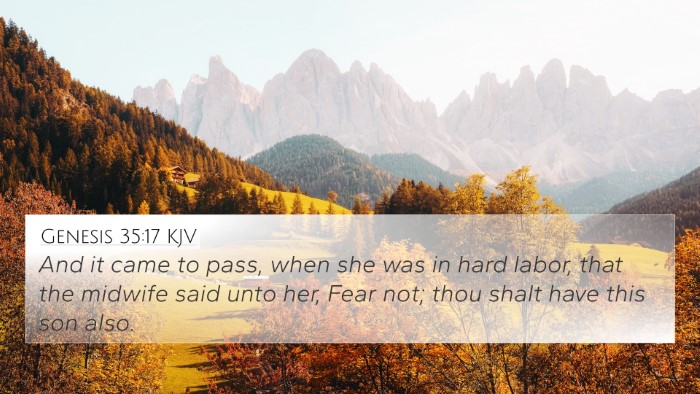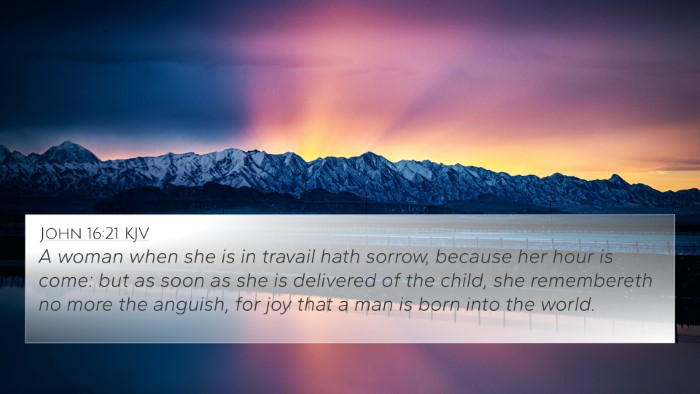Understanding 1 Samuel 4:20
Bible Verse: 1 Samuel 4:20 - "And about the time of her death the women that stood by her said unto her, Fear not; for thou hast born a son. But she answered not, neither did she regard it."
Summary and Analysis
The verse occurs in the context of a tragic event where the wife of Phinehas, Eli's son, experiences the profound grief of losing her husband and the Ark of the Covenant due to the Philistine defeat. The moment of her childbirth coincides with the news of calamity, highlighting the intertwining of sorrow and new life.
Commentary Insights
- Matthew Henry: This commentary emphasizes the overwhelming nature of grief that can dull the joys of life. The mother’s response signifies a deep sorrow that overshadows the delivery of a son, showing the weight of her losses.
- Albert Barnes: Barnes notes that the death of her husband and the loss of the Ark collectively cast a shadow over her experience, leaving her unresponsive. This highlights the emotional turmoil a parent may endure in times of distress.
- Adam Clarke: Clarke reflects on the cultural implications of childbirth and mourning. He discusses how this moment illustrates the tragedy of human conditions, balancing joy and sorrow, which resonates throughout scripture.
Cross-Referencing Related Bible Verses
This verse can be cross-referenced with several key scriptures that enhance our understanding of grief, childbirth, and the interplay of joy and sorrow:
- Ruth 4:14-17: This passage shows the joy of Naomi and Ruth in the face of loss and brings out themes of redemption and hope.
- John 16:21: Jesus speaks of a woman in labor, illustrating how joy comes in the morning after the pain of childbirth, connecting the theme of sorrow turning to joy.
- Lamentations 3:31-33: This passage emphasizes God's mercies even in suffering, aligning with the mother's grief yet underscoring hope.
- Isaiah 66:9: A parallel in the Old Testament highlighting God's promises regarding new life and the pain surrounding its arrival.
- Luke 2:7: The birth of Jesus in humble circumstances mirrors the mother’s plight, linking themes of suffering and joy.
- Genesis 35:18: Rachel’s death while giving birth to Benjamin links childbirth with sorrow, emphasizing the echo of personal loss.
- 2 Samuel 12:15-23: This passage reflects David's grief for his child, resonating with the themes present in 1 Samuel 4:20.
- Matthew 2:18: A fulfillment of prophecy that connects sorrow at loss with the hope of future joy, reflecting on the lamenting of mothers.
- Psalm 127:3: This verse states that children are a heritage from the Lord, bringing forth hope amid human loss.
- Philippians 4:6-7: Encouragement to approach God with prayer during times of grief shows how faith can sustain one through personal adversity.
Thematic Bible Verse Connections
Within biblical narratives, themes of childbirth, loss, and redemption arise repeatedly. The following thematic connections help illuminate the meaning of 1 Samuel 4:20:
- **Fear and Faith:** Throughout scripture, characters face fear tied to significant life events; the call to 'fear not' reflects a reassurance found in many verses (e.g., Isaiah 41:10).
- **Grief and Comfort:** The Bible consistently addresses grief, as seen in Psalms and Lamentations, emphasizing God's presence in sorrowful times.
- **Life's Duality:** The juxtaposition of joy and sorrow, as experienced in childbirth, echoes through various stories, demonstrating the complex nature of human experiences.
- **God's Faithfulness:** Despite loss, the narratives converge on God's steadfast love and promises, encouraging believers to maintain hope.
Tools for Bible Cross-Referencing
For those interested in exploring cross-references, various tools can aid in studying connections between Bible verses:
- **Bible Concordance:** A valuable resource for locating specific words or themes in the scripture.
- **Cross-Reference Guide:** Offers an organized systematic approach to finding verses related to a specific scripture.
- **Online Bible Tools:** Websites and apps designed to compare verses and offer insights into inter-Biblical dialogues.
- **Commentary Texts:** Rich resources for deeper analysis of scripture, often providing thematic and cross-referential insights.
- **Study Bibles:** Many editions include cross-references in the margins, guiding readers through thematic connections.
Interpreting Biblical Themes Through Cross-References
To gain a fuller understanding of passages like 1 Samuel 4:20, one can develop skills in:
- Identifying connections between Old and New Testament passages to enhance theological interpretations.
- Utilizing comparative analysis methods for exploring various books, especially the Gospels and Pauline epistles.
- Creating thematic studies by linking verses that address similar subjects, such as grief, loss, childbirth, and divine comfort.
- Conducting detailed studies employing both Old Testament prophecies and New Testament fulfillments.
User Intent Keywords
As you delve into the study of 1 Samuel 4:20, consider how this verse connects with other scriptures regarding:
- What verses are related to 1 Samuel 4:20?
- How do 1 Samuel 4:20 and John 16:21 connect?
- Similarities between 1 Samuel 4:20 and Genesis 35:18?
- Bible verses that support the themes of loss and childbirth.
Conclusion
1 Samuel 4:20 offers profound insights into human emotions—grief, loss, and the sacredness of life. By exploring biblical commentaries and using effective cross-referencing tools, one can uncover deeper meanings and connections throughout scripture, enhancing one's faith and understanding of God's omnipresence in our struggles.
